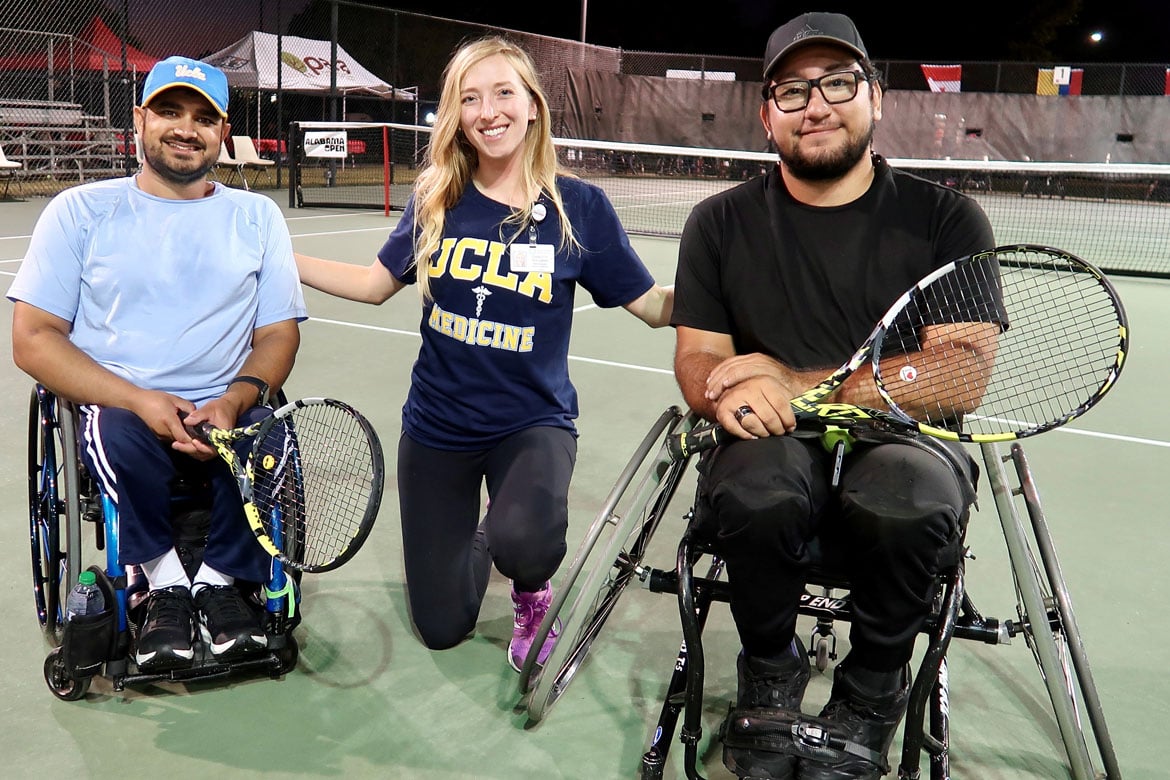Every future physician’s journey is shaped by their life path. For Charlotte Poplawski, MD, that path included some unexpected detours.
At 17, Dr. Poplawski became disabled after an unsuccessful surgery to treat an egg-sized grade 4 brain arteriovenous malformation. She would go on to have three brain surgeries during her time in college, the last of which left her with partial vision loss among other effects.
“I spent months in an acute rehab center where I relearned how to read, write and walk,” said Dr. Poplawski, who began her residency training in the internal medicine program at Harbor University of California, Los Angeles (UCLA) Hospital earlier this month. “I started medical school with a large, visible scar and chunks of hair still missing from my scalp. Shortly after starting medical school, complications from my most recent brain surgery forced me to take a medical leave of absence to finish recovering.”
Not one for idle time, Dr. Poplawski’s time away from the David Geffen School of Medicine at UCLA led her to discover a passion for adaptive athletics. As competitive or recreational sports for people with and without disabilities, adaptive sports use modifications of rules or equipment that allow for equitable participation in sport.
As she prepares to enter residency, Dr. Poplawski has grown into a staunch advocate for disability care and created programs that support adaptive athletes across Southern California.
For medical students looking to hone their leadership skills, the AMA offers the chance to distinguish yourself through more than 1,000 leadership opportunities and skill building through online training modules, project-based learning and more.
Understanding adaptive athletes
During her time away from medical school, Dr. Poplawski moved to Australia to work on a research project at the University of Sydney. The project investigated the effectiveness among elite athletes with cerebral palsy of a 10-week-long intensive strength and conditioning program in improving performance in their chosen sport. She also coached Paralympic and Australian national level athletes daily, assisting with adaptive fitness equipment.
Upon returning to the U.S. and resuming her medical training, Dr. Poplawski was determined to pass along the lessons she learned from working with adaptive athletes. She launched Thrive Adaptive and built a system of medical coverage and support for adaptive sports that was virtually nonexistent in Los Angeles.
To expand the scope of the operation, Dr. Poplawski recruited medical students, residents and attending physicians. She trained them on the unique aspects of working with adaptive athletes. The group grew—with volunteers from seven medical schools, 30 residency programs, five fellowships, one nursing school and 10 hospital systems—to the point that it now offers medical support to the largest adaptive sports organizations in Southern California.
To date, Dr. Poplawski has recruited and trained over 300 medical students and physicians to provide medical coverage at adaptive sports events that previously had zero medical support.
Volunteers work as support for a wide variety of adaptive activities including, adaptive swimming, wheelchair football, sitting volleyball, wheelchair tennis, goalball (a sport for the visually impaired), curling, table tennis and track and field events. The ways in which volunteers treat and interact with athletes varies by activity.
To treat athletes at adaptive surfing events, for instance, Dr. Poplawski developed specialized beach first aid kits. Medical volunteers are trained in common adaptive surfing injuries (from shoulder dislocations to minor abrasions) and how to treat them. Medical volunteers also get in the water to help athletes with a spectrum of disabilities safely catch waves.
“After their experience, medical volunteers report a better understanding of what disabled bodies are able to do, feel more comfortable interacting with folks with disabilities, and are more knowledgeable about local adaptive sports opportunities in Los Angeles,” said Dr. Poplawski, whose disability doesn’t affect her mobility. “And when they return to volunteer again, they bring their patients.”
Leading as a med student
The programming Dr. Poplawski started as a medical student led to a $200,000 grant to expand the program. Her original aims, however, were more humble. As a person with a disability, she wanted to create greater awareness and understanding of what the experience is like.
“Lack of physician knowledge about disabled populations” can lead to health inequities, she noted. “Many medical schools have inadequate education about disability. ... Adaptive sports are an excellent way to teach disability in a fun environment.”
Reflecting on her experience in building the adaptive athletics medical support programs she created, Dr. Poplawski offers this advice to others: If you see a problem, you can find a solution.
“What leadership means to me is that everything is your problem,” she said. “Say you are the CEO of a company. Part of your role is that if anything at the company goes wrong, you have to take responsibility for it and be part of the solution.
“When I think about disability advocacy leadership, what it means to me is that everything happening is your responsibility to be an advocate and do something about.”
As she moves to residency, Dr. Poplawski aims to continue to recruit and grow her medical support for adaptive athletic events. For others looking to build out their own passion projects, she said time is one of the most valuable assets, particular for medical students who may not have a mastery of the clinical aspects of medicine.
What’s going to move the most work, clear the most land, lay the most groundwork is time and energy,” she said. “You can always ask other people for expertise. You can always consult people for the right way to go about something. From my experience the most impact happens when somebody with enthusiasm combines it with energy.”
“Just because you are a medical student, don’t internalize that label. There’s a ton you can do in areas that interest you in whatever stage in training you are.”





